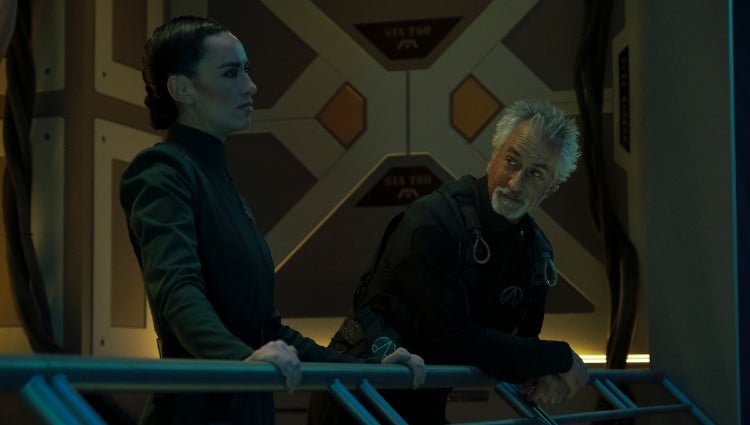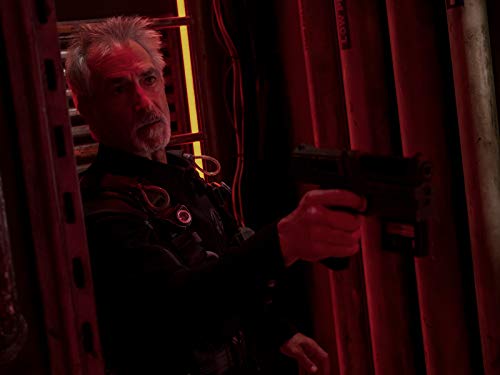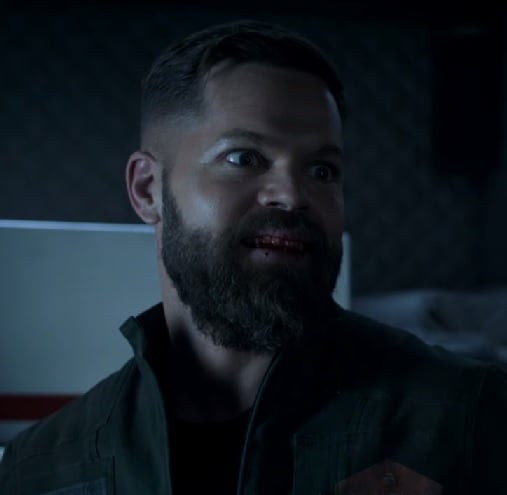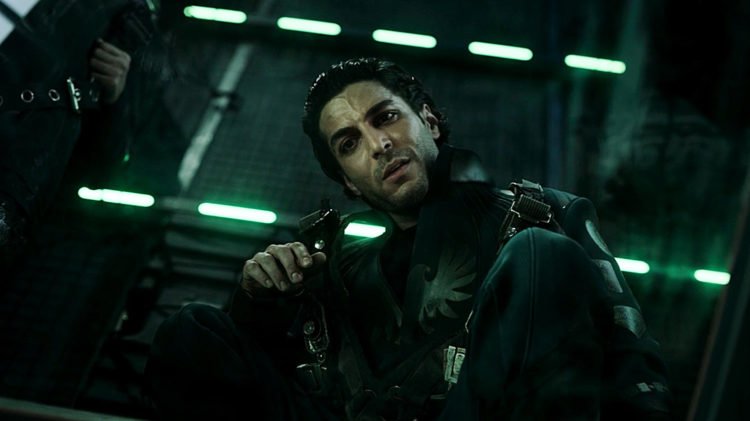
“Violence is indiscriminate. If you use it as a tool, it will do more than just kill your enemies. Sometimes it will kill the ones you love most.”
Taking a similar approach as the previous episode, “Cibola Burn” gives us a glimpse into the otherworldly energy that exists beyond…or between space. Instead of Miller’s point of view, it’s Elvi Okoye. After Holden skipped out to save Amos, she was left holding the bag, ultimately ensuring the good guys win the day. The reaction she helps Miller complete knocks the laws of physics back into place, allowing the ships in orbit to regain their fusion drives. The aftermath includes giving the Belters the opportunity to remain on Ilus and rebuild (with the help of Elvi, Fayez, and the other RCE scientists).
There’s not much discussion on this part but that tidbit of news does hint that when faced with the impossible or dangers not of their making, even tribes at odds can find common ground, providing hope for their futures. The hope and satisfaction here, particularly since it’s so early in the episode, seems a little too hopeful and as things wind down, we realize that calm of Holden and the Roci making things right masks what is perhaps one of the most sickening season-ending cliffhangers you’ll see on television today.

While Bobbie navigates the deeper conspiracies of Mars, Avasarala’s election loss to Gao, though bad, is not as damaging to her psyche as Arjun’s decision to stay on Earth when she heads to Luna to aid in the transition of the new UN Secretary General. Despite her underhanded use of tragedy to maintain her position, if there’s one thing present in Avasarala here is that she seems to have gained a bit more perspective; not just on her position but also the pitfalls that come with the job. Her words of advice to Gao — to remember who you are and not to let the office define you — is insightful and attributable to so many circumstances. Avasarala has never been one for self-reflection, the pressures of her duties haven’t really allowed that type of thinking but being able to step away from the bustle of politics and the system squabbles is about as good a time to put one’s life in perspective as any.
This train of thought provides a perfect segue to perhaps the most transformed character from one season to the next: Klaes Ashford. Though his was on the tail-end of his OPA strictures last season, Season Four has given us a man who is just as strong and capable as he has been but much more insightful as to actions he once followed like scripture. This understanding of that long-famous quote on how “violence begets violence” is all the fuel Ashford needs to track down Marco Inaros. Call it refined or more attune with life and reality, but Ashford understands the dangers a man like Marco poses, not because of his beliefs but also because of all the lost, angry, and bitter souls out there who will flock to his honeyed words, never taking the time to see just how evil their actions are. Thus, when Ashford tracked down Marco and had the man in his sights, it was frustrating that he did not pull the trigger.
Yes Marco’s son Filip (Jasai Chase Owens, The Deuce, Loseville) probably kills him but Ashford knew that surrendering would not change his fate, so why hesitate? Was it the fear of transforming Marco into a martyr or something more personal, like not wanting to force Naomi Nagata’s son to dip his young hands in blood? It’s one of those unanswered questions that we’ll remember, not just as The Expanse loses one of the more fascinating characters on the show but also the jaw-dropping cliffhanger of Marco’s plan coming to fruition: firing an asteroid painted in Mars stealth-tech at Earth. The calamity such an attack will create bears not thinking about. But that is where we are left…

Whereas “Saeculum” provided a magnificent bridge, it was still up to the finale to deliver. “Cibola Burn” does that, wrapping up all the major threads of Season Four, though all may not land with viewers. The positives on this front are in our beloved Roci crew are no worse for the wear and though we never see it, the satisfaction of Amos finally getting to lay hands on Murtry was the perfect capper. Avasarala losing her office is a more somber affair, though Bobbie’s strife provides the fuel for what comes next. Often times, when a finale is tasked with wrapping up open plot threads while opening up bigger mysteries for the following season, the latter instance is usually tossed in like a small promo and nothing of real substance. “Cibola Burn” does not do that; it merges some of the ending threads to the story with the horrors that await our characters in the future. It is also a perfect rendition of what The Expanse has been about: for every crisis averted, there’s another one on the horizon.
Tilting at Windmills
Out of all the wonderful seasons, this most recent offering into the world of The Expanse is the series’ best yet. The adventures on Ilus were a welcome change from keeping everything space-bound but for those relishing those scenes, there was plenty to spare. We also got an extended time on Mars and, thanks to the partnership with Amazon, the wide shot effects were bigger and better than ever.

Beautiful visuals aside, what makes The Expanse such a memorable and profound show is its characters. Season Four delivered some massively effective character arcs for some of our favorite folks. From Bobbie needing to find her way after a lifelong dream was taken from her to Amos’s surprising journey towards a deeper aspect of his emotional spectrum; but perhaps no character stuck with me more than the beautiful arc of Klaes Ashford. I cannot say enough about David Strathairn’s performance but the eloquence of his journey, a man steeped in violence for so long finally understanding that living in that world only creates more and more bloodshed was such a poetic narrative.
In all, Season 4 shone a poetic (and, at times, disheartening) light on humanity’s inability to get out of its own way. Even when something bigger comes along, like the Builders and their Ring Gate, mankind continues with the same damn petty squabbles, unable to see past their own individual self-interests. But as Ilus showed, there are some of us that find a way past that, that see that greater purpose only achievable through cooperation with those who may not share all of our values but, in the end, are still human beings like us. The Expanse shows that people will always gravitate towards tribes — those folks more like themselves — but in order to ascend beyond the mundane and reach the vast potential, eventually we’ll have to find a way to come together, not as a tribe divided into Belters, Martians, or Earthers, rather a tribe of the human race. Because if a species as technologically vast as the Builders could be wiped from existence, what chance does humanity stand when divided?
‘The Expanse’ Season 4: 9.5 out of 10
